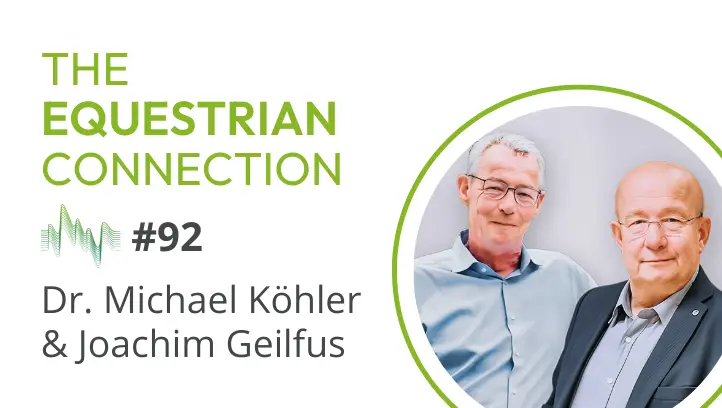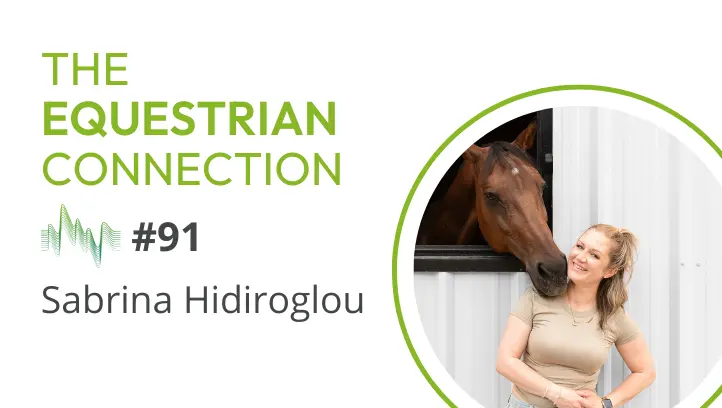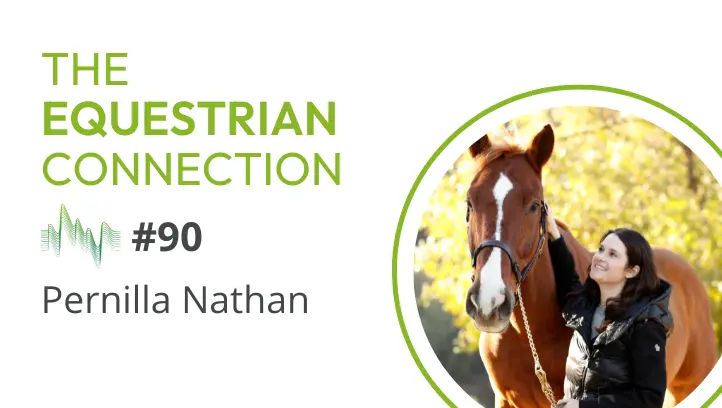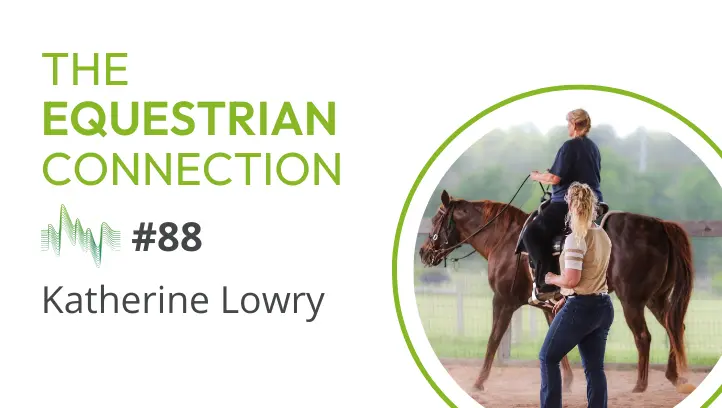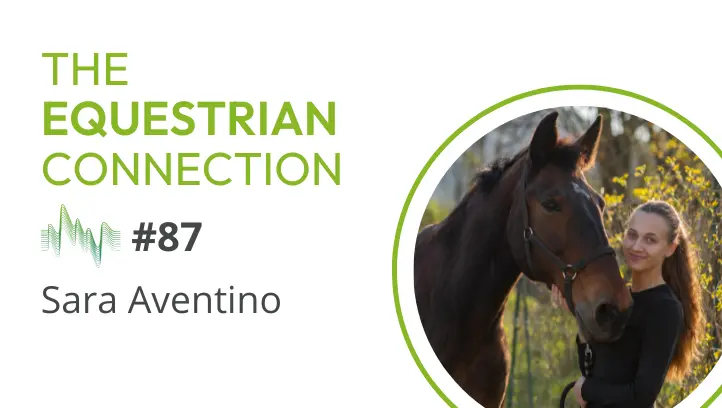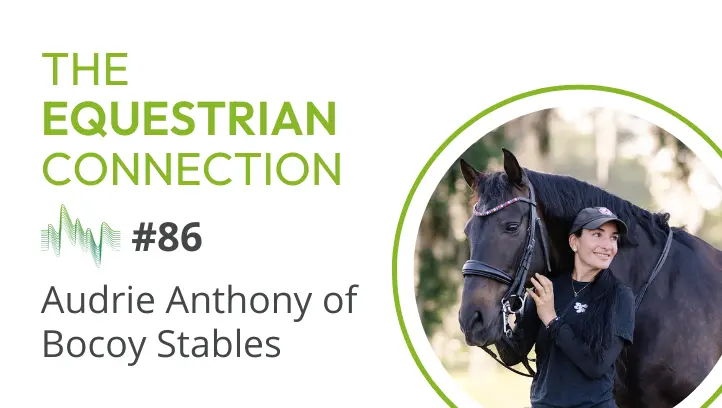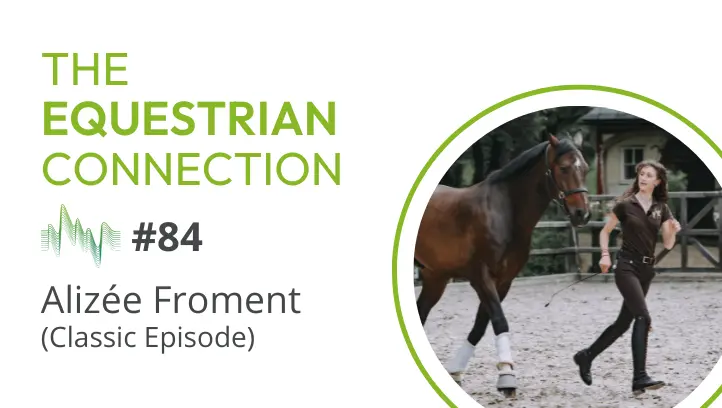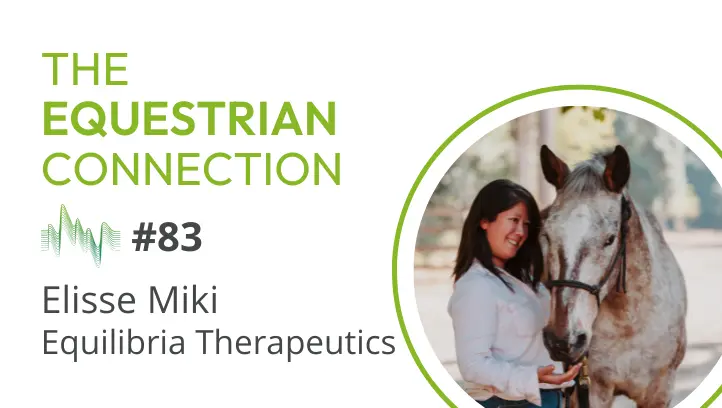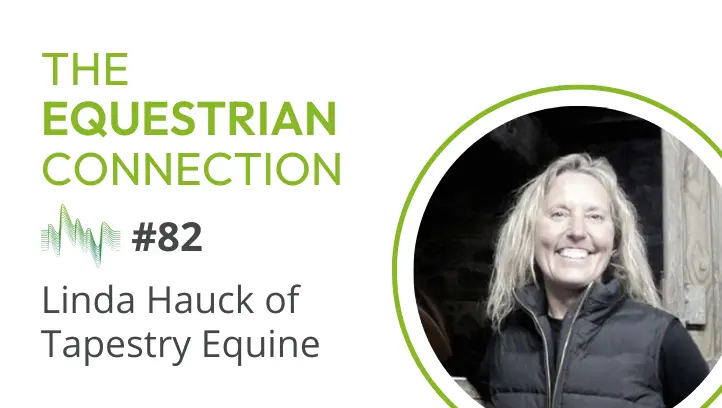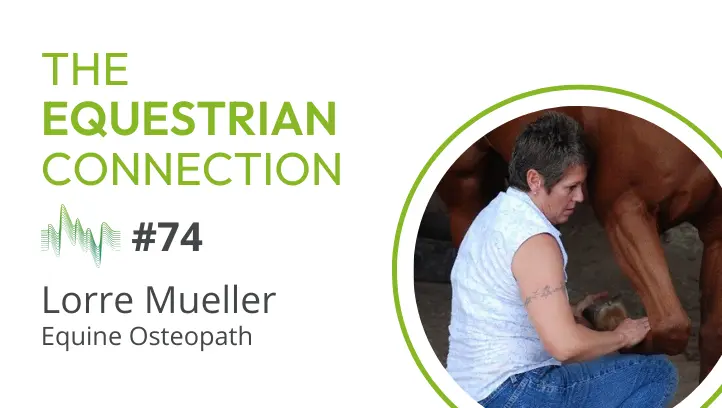#17 Balancing Equestrian Sport and Life as a Professional Rider with Anna Buffini
Anna Buffini is a professional dressage rider with accomplishments such as being a 2022 World Cup finalist, a rider on the 2021 Compiègne, Rotterdam & Aachen 5* Nations Cup Teams, the 2016 U25 Champion, and the 2014 US Young Rider Champion.
Anna is such an inspiration to many dressage riders, and riders in general, and her joyful and motivating social media content makes her a role model athlete for equestrians of all ages to follow.
On this episode, we discuss things like improving yourself on and off the horse, staying motivated in the sport, equestrian life balance, and so much more.
Podcast Transcript
This transcript was created by an AI and has not been proofread.
This transcript was created by AI and has not been proofread
[SPEAKER 1]Welcome to the Equestrian Connection podcast from wehorse, the online riding Academy. My name’s Danielle Kroll, and I’m your host. On this episode, we’re talking with Anna Buffini, a professional dressage rider with accomplishments, such as being a 2022 world cup finalist, a rider on the 2021 Compagnie Rotterdam and Aachen five-star nations cup teams, a 2016 under 25 champion, and the 2014 U.S. Young Rider Champion. Anna is such an inspiration to many dressage riders and riders in general. And if you’re not following her on Instagram, you really ought to be. Her content is inspirational, motivating, and will light up your feet. I’m so excited to chat with her today and discuss things like improving yourself on and off the horse, staying motivated in the sport, equestrian life balance, and so much more. So let’s dive in. Anna, we are so excited to have you here with us. This is a podcast episode that’s not only exciting for me and the wehorse team, but also everybody that tunes into our podcast. So thank you so much for being here with us and taking time out of your busy schedule.
[SPEAKER 2]Thank you for having me. I love working with you guys. The work you do is incredible. So it’s fun for me.
[SPEAKER 1]Thank you. So let’s dive right in. Starting at the beginning, how did you get into horses and what were your first few years like as an equestrian?
[SPEAKER 2]I was a gymnast trying to actually make the US team from age two to nine. And I was too injured and it was a pretty negative sport. So my parents pulled me out. And honestly, I think horses were just in my blood. I have been obsessed with them since I was born. I always collected them. I watched every horse movie, TV show. I owned every single horse book on the planet. And I begged for years to ride a horse. I think it was just, I was born with it. And the second I sat on a horse at age 11, it was over. My poor parents were done. So I just fell in love and I just happened to start riding dressage. I didn’t know what the disciplines were, but it’s so much like gymnastics where it’s, you have to have perfection. You are getting judged. You, you know, have to wait for your score until the end and the suspense is dreadful. So it’s, it’s a sport that lines up with my personality really well. But yeah, I just, I was meant to be a horse rider. I love it.
[SPEAKER 1]So you didn’t like dabble in other disciplines. You started immediately with dressage.
[SPEAKER 2]I started immediately with dressage. And honestly, I think every equestrian should start with dressage. It gives you such a good foundation. But I love the others. And I will definitely in the future, once I’ve accomplished a lot of my dressage goals, I definitely am going to own a jumper. I’m going to own a Rainer. I love the other disciplines. But just to, you know, I want to try and see how far I can get in dressage. So I have to focus all my attention and efforts in that right now.
[SPEAKER 1]I completely agree with you that all foundations of riding should start with dressage. Where I am is a very hunter-jumper community and we right away start off with, okay, when are we going to jump? When are we going to jump? And I just feel like there’s so much of the foundational, like fundamental aspects of riding that are missing when we just focus on the other aspects of other disciplines. Completely agree with you.
[SPEAKER 2]Yeah, I think it gives you a good head start.
[SPEAKER 1]Are you feeling inspired to start introducing dressage movements to your horse? Or do you dream of advancing through the levels? No matter where you and your horse are in your journey, WeHorse can help. Check out WeHorse.com to access over 175 online courses with top trainers from around the world. We have courses on everything from dressage to groundwork to show jumping to bodywork, including specific courses on starting your horse with dressage, learning and practicing specific dressage movements, and all the way up to advancing through the dressage levels. And, as a member, you get access to everything in our WeHorse library to watch whenever you want. Oh, and we also have an app, which means you can download a course or a video to watch without Wi-Fi, which is perfect for those days at the barn when you want a quick dose of training inspiration before your ride. So what are you waiting for? Go to WeHorse.com and check out our free seven day trial to access our WeHorse library and see if it’s a good fit for you. We can’t wait to see you in there. And now back to the episode. Absolutely. So throughout your riding journey and all of that, you were a working student and you started out grooming for yourself. Now, was that as you entered in your professional career or still as an amateur? I know obviously I’m an amateur rider and I groom for myself. But did you, like as you entered into your professional career, were you still grooming? Was there a transition? How did that all happen?
[SPEAKER 2]Yeah, so I groomed for myself from ages 11 to 21. I was a working student most of those years as well. And I turned professional at 18. So I still groomed for myself for a good three years solely. I had some help at shows, of course, when you have multiple shows, you need help. But at home, it was all me. And then once I started getting so many horses in my stables, I had to hire professional help. And they’ve been incredible. But I really, for me personally, I I can’t even imagine being a writer without being a groom first and being a working student first. And I know it can’t work out for everybody like that, but if it’s possible, I mean. you get to know your horse under saddle by grooming them, by knowing every single little detail about them, by knowing which tiny little leg is swollen, which, you know, their personality when you’re brushing them, when you’re girthing them, when you’re putting the bridle on, what bits they like and how that transfers over to riding. That’s the reason I’m able to connect with my horses so well is because I still groom them to this day, just as much as I can. And I’m in charge of my horses completely. You know, a lot of times, If you have 40 horses, you can’t keep a close eye on all of them, but I have, you know, I’m working with about 10 horses a day, so I know every single thing about them. And if they come out funny or if I miss something, like I don’t blame my groom, I blame myself because I know so much about them and I know how much it carries over into the training ring and then in the show ring.
[SPEAKER 1]I have two horses and I find it exhausting.
[SPEAKER 2]So it is exhausting.
[SPEAKER 1]I know.
[SPEAKER 2]And that’s why it’s like we don’t have to. There’s a good balance, you know, because there is a balance of like working students being killed out there and being taken advantage of. But then there’s also the aspect of not putting the work in with your horse by yourself. So it’s exhausting, but it pays off so much.
[SPEAKER 1]Absolutely. Absolutely. Let’s talk a little bit about when you were a working student. The experience of that, how maybe a sense of work ethic has gotten you to where you are today, because obviously being a professional rider and having any sort of success does require a significant amount of work ethic. So how did being a working student maybe play a part in that, or do you think it did?
[SPEAKER 2]Yeah, absolutely. I think anyone who’s been a working student knows the trenches and what it’s like. You are up before everyone else is up and you go to bed after everyone else is asleep. It makes you push past what you think you can push past, you know, it gives you a lot of just drive, honestly, to keep working, to get hired, to kind of make it out of the working student position because you wanna be the rider, you wanna be at the top and, you know, grooming the horses for people and seeing them ride just motivated me so much to get there one day. So I was super blessed to be able to have good horses after I turned like 18, I, um, I was able to have the opportunity on some good horses, but, um, what most people don’t realize is like for eight years, I was like a straight up groom working student. I rode a pony that bucked me off every single day. And, um, I was, I was just grinding until I, I made it. And, um, it absolutely has a huge effect on how I ride, how I work and my work ethic today.
[SPEAKER 1]What advice would you give to young riders or any other riders that maybe kind of want to get into professional riding or riding training as a career? What advice would you give them in getting started?
[SPEAKER 2]I would say number one, social media is a huge tool. Like reach out to everybody you know that rides horses, reach out, like send out a hundred DMs a day. You know, there’s going to be someone who needs help and just start wherever you can. And if you have a good attitude, a good work ethic, if you have talent, that’s really important. Um, someone’s going to want you, someone’s going to want to keep you around and you’re going to get opportunities, but you have to, really, really work hard. You have to train harder than anybody else. You have to show up earlier. You have to stay later and prove that you’re worth putting time into and that you are willing to develop the talent that you have. But it’s possible. But you do have to put a lot of work in at the start. But especially nowadays, I mean, make it a job, make it like a job listing, you know, like message people every single day, ask people, you know, make a network, reach out. And the most important thing is have a great attitude. You never know who you’re talking to. I come in contact with so many young writers all the time. And really within the first meeting, I know if I’d want to have them as a working student, or if it’s someone I don’t. want to work with. So your reputation is the most important thing in the sport. Make sure you have a good reputation, a good work ethic. Don’t be entitled. Don’t be lazy. And really the key is work harder than anybody around you and you’ll stand out.
[SPEAKER 1]That’s such good advice. And even bringing it back to the idea of social media, like That’s where everybody is nowadays. That’s literally their business card. So that’s, yeah, that’s, I think, really important for a lot of people is like you said, like work the DM, be consistent. So that actually ties in to a question that I have. I read in a Dressage News article that you never indulge in two characteristics that are common in high performance sports. One is making excuses for failure, and the other one is self-promotion when things appear to go well. So it’s like the idea of staying really humble. Is that something that’s a practice for you, especially as you achieve more success? Or is it something that was instilled from you in the start, maybe from your family values?
[SPEAKER 2]Definitely for my family values. It’s all starts who I am is is all begins with them. I having some incredible parents. I’m really grateful for and they were both athletes. So they really helped us develop since the beginning in an athletic mindset and just what I’ve learned over the years. I mean, I’ve competed in so many sports and the second you get cocky you need to leave. you know, the second you think you’re too good, there’s no time for you um in this sport and people will realize that and you’ll get a reputation for that. Um and then also when things are going well, you gotta just keep going because it’s going to get hard and I think social media is a great tool and it’s a hard tool. It’s a blessing and a curse because we only put most of our highlights on there and that’s not completely real all the time. But if you do put your failings on there, then you get hate for it, you know, or someone picks out that your horse is a little above the bed or you’re sitting a little bit to the side or something. So, um, it’s definitely something tricky to navigate, but I think You just need to be as honest as possible with yourself, with your followers. And yeah, don’t get too high. Don’t get too low. You’re never too big to clean up poop. My coach always says, you know, um, and then you’re never too small to achieve your dreams.
[SPEAKER 1]I love that. So you’re actually quite active on social media and when you had mentioned the idea that it’s it can be hard it’s a highlight reel and you know then there’s a lot of um what are they called the when they’re like the coach um I can’t it’s like a sports term when somebody sits on the coach but they’re the ones that are like the constantly saying, oh, we should have done this. We should have done that. Oh, yeah, I know what you mean.
[SPEAKER 2]I don’t know the word, but I understand.
[SPEAKER 1]Yeah. So what’s your relationship like with social media?
[SPEAKER 2]I think same thing. It’s a blessing and a curse. I’ve been really lucky. I have such incredible followers. I don’t have a huge following, but they’re so loyal, I think, because I really tried to be honest throughout the years. And I my approach to it is that I want to leave a mark on this world.
[SPEAKER 1]that’s a positive one.
[SPEAKER 2]I wanna leave it better than I found it. So anything I post, I want it to be either something joyful or something motivating, something encouraging, something funny. I think the world’s a tough place and I wanna make my page someplace you can go to get away a little bit. Cause that’s how I use social media a bit. I don’t necessarily use it to like watch training videos all the time and be super intense. I use it to get away from the intensity of my life. And so when a lot of people are, you know, rightfully so posting intense things and maybe political things that they really believe in, like I’m, I’m happy for them. But for me, I want to make it a place of joy, a place of positivity, a place of realness, too. I mean, I’ve posted my failures on there. When I mess up, I say I messed up. You know, I’m not like, Oh, you know, the judges, I was two points away from getting a 72. If I didn’t make this mistake, like, no, I got a 69 cause I screwed up and I got last place and that happens and that’s real and I move on. So I think for me, I get really encouraged by seeing people’s hardships, but then I also get a lot of joy out of seeing their triumphs and it’s encouraging. And that’s what I want to be to people.
[SPEAKER 1]What do you feel is the importance of professional athletes being on social media? Do you think it’s an important thing to show the different sides of the sport? Do you think that sometimes it’s a controversial thing? Let’s talk about that for a sec.
[SPEAKER 2]Honestly, I think it’s all the above. I really do. I think it is condemning sometimes you see these articles and maybe the pictures taken at the wrong time, and then you’ll see 300 comments of absolute hate for one wrong moment. And then you’ll see, you know, people who get together and have raised money for, you know, someone who has cancer or someone who fell off and needs to pay medical bills. So, you know, you can’t just be like all social media is bad because it does so much good, but I do think it’s definitely a time that no generation has experienced before and figuring out how to navigate that is really tricky. So I really do think it’s all the above. It’s great. It’s hard. It’s not totally honest. It’s just a really tricky place, but it’s also, I think, especially for. Riders for athletes. It’s super important. I mean, all of my brand deals I have are because of my social media following, you know, and I know a lot of people rely so much on brands and, um, income because of social media. So I think just figuring out how to navigate it and use it correctly, um, and then getting help if you need, like, I’m going to start using a social media team because, um, I’m going to be showing so much. I don’t have time to be like, Oh, I need to get this 15 second shot and I need to do this and this.
[SPEAKER 1]I love it.
[SPEAKER 2]I love creating content.
[SPEAKER 1]Actually.
[SPEAKER 2]I would probably be like a social media manager if I didn’t ride horses, but, um, I think getting help, making sure you don’t get too deep into it. And then if you get a hate comment, you got to let it go right over your head.
[SPEAKER 1]You know? Yeah, absolutely. That’s interesting about getting a social media team. I think that it is something that a lot of people could benefit from because you see people that could have really good platforms and they’re just so busy, right? It’s like, it goes back to the whole idea of having multiple horses and trying to groom them yourself. Like it just, you need the help in order to, get to where you want to go. If you want to get the brand deals, if you want to, you know, be more known as an athlete, you do need to have the help. It’s, you know, same as grooming the horses. Yeah.
[SPEAKER 2]You have to do it. And there’s this network also real quick. It’s called Upwork that I’ve used before. And they’re actually, um, like some pretty affordable people to help with your social media content. Cause it can be super expensive, but these, a lot of them are like college kids, you know, trying to have a side hustle. So if anybody’s looking for a cheaper social media manager, um, The Upwork or online places you can find like that are good.
[SPEAKER 1]Oh, that’s interesting. That’s super helpful for a lot of people as well. Interesting. I feel like I’ve heard of them. But yeah, maybe we’ll link that in the show notes if anybody wants to check that out. Yeah. So with your social media, I feel like we’re narrowing in a lot of social media stuff here. you post a lot about your fitness journey as well. So you’re sharing a ton. I mean, I see you doing like handstands, like crazy things. Is that obviously as a gymnast that plays a part in it. But was there a moment? I know Sunday boy being a strong horse inspired you to get into fitness. Was that the reason? Was there, you know, Other things, how has the journey played out? Let’s discuss a little bit of the fitness side of being a horse rider.
[SPEAKER 2]Yeah, so I got super fit as a gymnast, like a little mighty mouse. I could do 50 pull-ups at eight years old.
[SPEAKER 1]Oh my gosh. Yeah.
[SPEAKER 2]But then after that, I just kind of did normal stuff, not too intense. Like I played basketball. So most of the time, most of my fitness was during practice for school and teams. And then I stopped playing basketball and all those sports. And I got into, as I got more serious into horses, when I got Sunday boy, I sat on him and I realized like I was not worthy of that horse fitness wise. Um, I could ride him or I was learning to ride him well with my, my skill and my talent, but it wasn’t enough. And I just thought I’m not going to be untalented and unfit enough for this horse. So I got to work. I just literally YouTube. I mean, so many people reach out to me for workouts and how to start YouTube. I mean, it’s free. There’s millions.
[SPEAKER 1]Yeah, I’m totally on there. Yeah. Yep.
[SPEAKER 2]It’s awesome. And now there’s like no excuses. You know, if you and if you have injuries, like I have injuries, there’s totally specific workouts for your injuries. So there’s no excuses anymore not to work out. But yeah, once I started doing that, I saw, I mean, my improvement skyrocketed riding wise and just my body awareness and my injuries started healing and I just got stronger. And, you know, the next year we went on to win a national championship and then two years later, another national championship. And, um, and it’s made a huge difference and it’s only carried on. I mean, I need, I’m twice as fit now as I was the Sunday boy, because now, I mean, he’s, he’s a piece of cake compared to the horses I ride now. So, um, I wouldn’t be the rider I am. I wouldn’t be the person I am. And I wouldn’t be able to own a horse like Fiantini and be able to ride her. She’s been ridden by, I mean, three big men in the past. And, um, she’s not, she’s a ladies right now, but when I first got her, she was not really a ladies ride and I wouldn’t have been able to do it if I didn’t work out. So it’s, it’s something a lot of people don’t make enough time for. It’s something people don’t take seriously. And a lot of times I have a little bit of a problem with it because You’re not able to be empathetic with your horse. If you don’t work out yourself, because it’s easy to just keep going and going when they have a lot of energy, they don’t take walk breaks. You don’t understand how sore they get, um, to really be an athlete. You need to work out now. It’s not, I know there’s a lot of people riding 15 horses out there. You’re all you’re working out as you’re riding. So I’m not telling you to get off your horse at 9 PM and go grind it out, but, um, you can always find a little bit of time to get some fitness in.
[SPEAKER 1]I think speaking of empathy towards the horse, not even just like being like, Oh, I get it. You know, I, I just did this cardio workout. So I know what it’s like. I also think it comes down to if you’re unbalanced, you’re bringing those imbalances to your horse. If you’re unfit, you’re bringing that to your horse. Like it’s, you’re asking your horse to perform like an athlete, but you know, if you’re not taking care of yourself, that’s not really fair. Exactly.
[SPEAKER 2]And I think we can’t be out there saying that this is such a hard sport if you’re not willing to put in the work yourself. So I totally agree. And I have a junior right now, actually, and she does a great job of it. She’s she sits crooked sometimes. And she says, OK, I’m going in the gym later and I’m going to work on this. And the next five days she works on it. And her lessons are better ever since she starts working on that. It makes a huge difference.
[SPEAKER 1]Yeah, absolutely. It’s like I would get all these body workers for my mare. And I was like, yeah, she’s kind of got this little stickiness on this side of her and whatever. And I’m thinking, gosh, I don’t really think that I’ve been a massage therapist for a while. Exactly. Maybe it’s me. Exactly.
[SPEAKER 2]I think self-maintenance too. A lot of riders, I think we grind ourselves to the bone and we need to also do rehab as well as workouts like we do for our horses.
[SPEAKER 1]And what about a sense of mental clarity? There’s obviously so many benefits to fitness apart from just being stronger. Do you find that that has improved endurance, cardio, all of those things of course, but what about a mental clarity, a sense of a better mindset, anything like that for your riding?
[SPEAKER 2]Absolutely. Number one, for me, it gives me mental toughness because when I am running my beach stairs and I am absolutely dying, but I keep going, I know that when I’m halfway through my Grand Prix wanting to throw up, I can keep going. Um, it’s made me so mentally tough and I know that I can get through anything physically, but also it’s a great escape. It gives you such good endorphins. Um, you just, you get to step away from everything that’s going on.
[SPEAKER 1]Um,
[SPEAKER 2]I think working out is so good for your brain. And also, I know there’s like a whole stigma about it, but I’m trying to help get rid of that in my own way. But therapy is huge also for mental. There’s a place called BetterHelp. It’s an online program, and it’s very affordable. So if anybody needs therapy, I have two therapists, like a psychologist or a sports therapist, and then I have a normal therapist. And honestly, I’m doing so well because of them. And I absolutely love it. So I think working out and therapy is huge to be a top athlete.
[SPEAKER 1]And what’s the name of the link again, I’ll put in the show notes.
[SPEAKER 2]It’s called better health, better health.
[SPEAKER 1]Okay. Yeah. Better health or help.
[SPEAKER 2]help, H-E-L-P.
[SPEAKER 1]Okay, perfect. I’ll put that in the show notes for everybody because I think that not only the stigma but also the financial resources around it is preventing people from taking better care of themselves. So that’s excellent. Thank you for that. Yeah, absolutely. So speaking of, you know, therapy or mental health, balance as an equestrian is you know, it’s pretty challenging. Not only are our horses very demanding, you know, with their feed schedules and all of those different things, but we also kind of get sucked into the world of the equestrianism and we forget to, you know, differentiate it from our own lives, our personal lives with our friends and our family that aren’t associated with horses. So what do you do for balance? Do you find it challenging to have a balance? What are your suggestions for people there?
[SPEAKER 2]Yeah, I find it very challenging, especially in those working student days. There’s some years you have to really just push it out and tough it out. And there’s some years where you have a breather and you need to make sure you’re taking care of your life as a whole. So I’m a huge advocate for finding things you love outside of the barn because it will also make you more eager to go back to the barn and ride. So I’m blessed.
[SPEAKER 1]I lived 15
[SPEAKER 2]minutes from the beach. I love the beach. So I go there all the time. Um, I, my cousin lives really close by. He’s one of my best friends. We go out to dinner a few times a week, just any little thing you can do. It doesn’t have to be huge things. It doesn’t have to be expensive things. You can go on a hike, you can go on a walk. Um, but I’d say Honestly, like especially for horse riders, we’re so enveloped in our horses lives. You have to force yourself to get away from the barn or else you will hit a burnout and you won’t love it as much. I’ve hit it multiple times and that’s why I’m such a huge advocate for doing things you love outside of the stables. Because in the end, like say one day I am blessed enough to go to the Olympics and somehow we win a medal or something. It’s going to be amazing, but it’s going to be sitting in my sock drawer. And if I have no friends, no family, no memories surrounding that and following that, it’s going to be pretty empty. So I think have your goals, set your goals, but make sure you’re creating a full life around your riding as much as you can.
[SPEAKER 1]That’s such a good point. Such a good point. Now, what about boundaries? Do you feel that you have to set boundaries, like have like an actual conversation with people? You know, don’t text me after these times or something like that, because, you know, especially at a boarding barn, if you’re not there with your horse, having your horses at your house or something like that, you know, you’re you are very plugged in wondering what’s going on. So do you feel that there’s a sense of boundary that has to be put in place?
[SPEAKER 2]Yeah, I think it depends a little bit what situation you’re in. If you own the boarding farm, you definitely need to set very strict boundaries. And if people don’t want to follow them, they can leave. And now with social media, you can find more people. I know so many toxic barns, and they think they have to hold on to these clients because they need the money and Just put a little bit of work in on social media and you’ll find more clients that make it a good environment. A good environment is huge for training. I am lucky enough that we just moved to a farm and it’s right in my backyard. So it’s very enclosed. For me, especially getting towards the top level, I have a bubble, I really keep myself in a bubble. And I kind of prioritize who’s allowed to be in the bubble, who’s allowed to, you know, even have my phone number. And then on competitions, usually I’ll give my phone to my manager or my friend or my mom, because it’s definitely not helpful to look at social media during competitions.
[SPEAKER 1]And
[SPEAKER 2]Yeah, you definitely have to set boundaries. And even things like, uh, when you’re out people, when people are out with me, they know, like, I don’t really drink. I go to bed when I want to, you know, it’s not, I’m not going to stay on party till 2am. I have to train the next day. So I really prioritize my life around my riding schedule and you just have to basically do it. And when people see that you’re going, this is how you’ve chosen to live. Um, they, they respect it.
[SPEAKER 1]Mm-hmm. Mm-hmm. It’s almost like having a, like a mindset boundary as well, because it could completely, if you’re allowing other things to be coming in and you’re going to these high level competitions, like it could really affect.
[SPEAKER 2]Hugely, hugely.
[SPEAKER 1]Yeah.
[SPEAKER 2]Mental game is so important. You have to protect your mental game.
[SPEAKER 1]Yeah, absolutely. Now, do you do anything to help with that in terms of like meditation or I know you’d mentioned going to therapy. Do you do anything else with your mindset game that you find has been helpful?
[SPEAKER 2]Yeah, I definitely have a routine now. One of my therapists is like a hypnotherapist, so I’ll do that the day before.
[SPEAKER 1]Always wanted to try that. It’s the coolest thing.
[SPEAKER 2]It’s the coolest thing. If any of you can do it, you should. Because a lot of times when you go to therapy, it feels like ripping open a wound and you leave and you’re still kind of icky. Hypnotherapy, I tell her all my things and then they just like put you to sleep at the end and you leave way more calm than you came in. It’s the, it’s the coolest thing. So I’ll do that.
[SPEAKER 1]Yep.
[SPEAKER 2]I love it. I’ll do it the day before the competition. So that already kind of gets me a little bit chilled out. And then, um, I basically pop in headphones all day long. I don’t talk to a lot of people. I don’t interact a ton. Cause I think that gets you out of your head space a little bit. Um, I stick with my horse, I stick with my people and then, um, For me, I listen to like comedy podcasts before I ride. I don’t listen to pump up music because I think I’m already pumped up enough. I’ll listen to hype music when I’m working out the day before, but I listen to funny things that just keep me happy, that keep me light. And yeah, and that’s kind of my routine before I get on my horse. So everybody just needs to find what works for them mentally, but you need to make a mental. game plan or else you’re going to be scattered once you get on the horse. And you don’t just get on the horse and you’re locked in. You have to prepare to lock in. Like right now, I’m three weeks away from my big CDI to qualify for the World Cup. And already I’m literally preparing myself mentally to be locked in then.
[SPEAKER 1]Absolutely. It’s interesting that you mentioned about the comedy podcast. I listen to a lot of podcasts, of course. and usually my go-to’s are like things around horses and riding or they are around business and marketing and I recently just started listening to some comedy podcasts and I’m just finding it such a nice change. Yes. Because like I would get so sucked into oh okay I should do this or should take some notes on this or you know you just you’re always productive and spinning. Yeah. And so instead I’ve just been listening to stuff and I’m just like laughing at like these random jokes and it’s such a nice it’s it’s a really nice switch. Yeah.
[SPEAKER 2]Yeah, absolutely. And I’m like, if I get on the horse relaxed and happy, that’s me at my best.
[SPEAKER 1]Yeah, absolutely. So let’s, um, I really want to talk about your recent Grand Prix freestyle when you were singing. Um, I love that. I love that so much. Um, tell us all about the experience of doing your freestyle and hearing yourself, um, leading up to it. What made you decide to do it? Um, and then, yeah, just the idea of like blending your passions. I love it.
[SPEAKER 2]Yeah, so I mean freestyles, everybody knows they’re my favorite thing in the world. If I could only ride freestyles the rest of my life, there’s an option I probably would. But yeah, so I’ve been a musician basically since I was five. I’m a worship leader at church and singing is my other passion. That’s another thing I would do if I wasn’t riding horses. So when it comes to freestyles, Diva was my first big time one I had to make. And basically I listened to a hundred hours of music and I narrow it down. And then I listened to that music again for another like 30 hours. And I pick out all the pieces. Um, I made the, the pattern and for Diva, I knew her so well, I wanted a degree of difficulty at a 10. So that was, that’s been really fun already, but yeah, I, uh, In 2020, during the pandemic, we found this band called BTS and they’re a Korean boy band. They’re the biggest band in the world since Elvis. They’re the biggest music group. And they just inspired me so much. I love their music. They made Corona year such a beautiful year through like the tragedy for us. It was a a place where like me and my family would sit after dinner and just watch BTS videos and music. And, um, it’s such a beautiful memory and they’re so inspiring. They work so hard. I always love finding inspiration. And so I wanted to have that when I was writing my freestyle. So I was like, this is it, this is music. And it’s such good music. And we went to their concert also in LA and I was like, yep, this is what I’m doing. So we started putting it together. And a couple of years back, I had sung in another one of my freestyles. Cause at first I was like, I don’t want this to be pretentious. I just, this is my passion. I love singing. I wanted, I wanted to sing in it. And some people heard it and they liked it. So I was like, what if I do this for the, for the big girl freestyle? And so it ended up working out and people loved it. And I got to put both my passions together. I mean, honestly, when you get to do that, you barely get to do one passion alone, much less two. So to have my voice in there, I think it’s so fun. And I actually have made a new freestyle for this year.
[SPEAKER 1]Yay!
[SPEAKER 2]And I am singing in it again because I think people love it. I love it. So we’ll see if it goes over as well as the last one.
[SPEAKER 1]Oh, that’s so exciting. I can’t wait. Not only was the freestyle amazing, but the song was so good. Thank you. It’s such a good song. So I can’t wait. I can’t wait for the new one. We actually, music really helped us during like the shutdown of the pandemic as well. So I am from Nova Scotia, Canada. So the Maritimes of Canada is like a very small, there’s like a little maritime culture here. And there’s this local musician, he sings a lot about the maritime culture. And he would every Friday night, he would go on YouTube, and we would stream it on our TV. And every Friday, you know, for months, we watched them. And it was so nice to have. It’s still felt like you were connected. You know, having that music throughout you know, such a horrible time.
[SPEAKER 2]Yeah, absolutely. It’s incredible that way.
[SPEAKER 1]Yeah. No, I, I like that that like shared coincidence there. That’s neat.
[SPEAKER 2]That’s awesome.
[SPEAKER 1]Now, you are also offering coaching and training to clients, correct?
[SPEAKER 2]Yes.
[SPEAKER 1]What’s it like? I can’t even imagine balancing your own professional career and then also training others. So what’s that like? How do you find the balance? I know we spoke before about balance between personal life and being an equestrian, but now it’s the balance of your professional career. How is that? How’s that going? And what advice do you have for people that are riding and trying to train or coach at the same time? Yeah.
[SPEAKER 2]I think again, boundaries are super important and I’ve made all the mistakes. So hopefully people can watch me and just listen to what I’ve done. And when you’re 18, don’t make my mistakes. Just learn from me. Um, because I’ve lived them all. When I first became pro, I took on way too much. It was mad. I was riding like 15 horses a day.
[SPEAKER 1]Um,
[SPEAKER 2]and just so scattered. And then when I did come to my lessons, they were good, but they weren’t great. And, um, you know, I had to get off and rush to the next lesson. So I know some people have to do that out of necessity, um, because, you know, you have to earn a living and pay for your horses. Um, but if at all possible, you definitely need to figure out a schedule that works for you. And then again, boundaries and keeping like your mental peace through all of it.
[SPEAKER 1]I have,
[SPEAKER 2]I scaled down a lot once I started competing, you know, overseas in Europe. And, um, when I, now, when I first meet interested clients, I tell them like my career right now comes first for me. Um, and they really respect that. And I’m so grateful for that. I only work with people who really respect that. Like I’ve been working 18 years for this. I’m so close. And, um, they, they understand. And if I, I refer them to a ton of other trainers, if they want a full-time, you know, coach that can hold their hand every single second of every single day, I know there are people that absolutely need that. And I’m just not that person right now. I can be, but I can’t be right now in the future, you know? Um, so I have a few really, really good young writers I’m working with right now. And, um, I’ve, really haven’t taken on more clients than that at the moment just because young writers especially are very involved you know you have to help completely with their schedule if there’s any vet work if there’s um they have a lot of travel and like i also help them with their social media which is fun and uh but again i set um schedules throughout the day so like this hour is their time and this hour is their time and you know they know if i don’t text back i’ll get to them at their time the next day so um just setting boundaries um setting schedules really being strict about it and just not letting things get in the way of your own training because that again is what’s most important because their training is most important to their life so my training has to be most important to my life
[SPEAKER 1]Absolutely, especially at this point. Now, we know the Olympics is the goal and we’re all rooting for you and hoping that comes to fruition. What do you hope, what do you foresee the future brings?
[SPEAKER 2]Yeah, I’m always so hesitant to talk about the Olympics because we don’t have to talk about the Olympics.
[SPEAKER 1]I love explaining this.
[SPEAKER 2]I do because I’ve known so many people who have been like, I’m going to the Olympics and that’s what I’m training for. And of course, that’s my goal. But I also don’t ever want people to think I assume I’m going to make it. I know how hard it is. You know, I’ve, I’ve been to Aachen, I’ve been to Rotterdam, I’ve been to a lot of, and World Cup, I’ve been to a lot of top competitions. I’m, I know how hard it is and I know how much better I need to be to be at the top. So it’s always going to be a goal of mine and whether it takes me three years or 30 years, I’m never going to stop trying. And I know I could work for the next three decades and not make it. You know, you have to have a lot of luck as well. The horse has to be ready. You have to be ready. Um, you know, Corona doesn’t have to, you know, there’s so many things that come into play. So I will never, ever be one that will assume I’m gonna make it and I just really hope that one day everything comes together and I can because I know that there’s so many people who have been supporting me for so years and I really want to do it for them. I want to do it for my parents. I want to do it for the feeding company. I want to do it for America and I want to do it for my horse and my coach and I just want it so badly that I will never stop working. I’m just never gonna assume that I can make it.
[SPEAKER 1]Well, we’re all rooting for you that you will.
[SPEAKER 2]Thank you.
[SPEAKER 1]Do you, let’s say, let’s say you go to the Olympics, let’s say you’ve got that medal that you’ve put in your sock drawer, like you had said, and, or not, you know, obviously we’re going to display that, but is there anything else you foresee past that? Like where, where do you want the rest of your career to go? Where do you want your training to go? Um, you know, what impact you want to make?
[SPEAKER 2]Yeah, so there’s quite a few things. I have so many dreams. One would be to literally go to as many big competitions as I can in my career. That’s the number one goal. I wanna see how far I can get, how many I can get, Lord willing. But during that time, when I’ve established myself and I’m able to maybe add more things to my plate, I wanna start like, I don’t know if it’s a foundation or some kind of riding club, but I want just more underprivileged kids to be able to ride horses. So whether if it’s me buying a full barn of ponies and having camps at my stables for free or sponsoring starting foundations and doing charities to sponsor kids, Um, I just want to make the sport more accessible because I know that’s the hardest part about it. And I know that’s something for me, that’s something I’ve gotten the most judgment and hate over is that, you know, my dad, uh, came over to America with $90 in his wallet and he worked his way up and, um, thankfully he’s able to buy me some really good horses, but, um, I also know how much hard work that takes and just facing a lot of that hate. It really has given me a heart for giving the opportunities that I’ve had to kids who couldn’t afford it or even adults, you know, whoever. And just to make the sport bigger, to make the sport more mainstream. I want like when Adrian Lyle goes to the next Olympics, she needs to like be on Jimmy Fallon. You know, I want to make it bigger. I want to make it more of a sport. I want more eyes on the sport. And I want to provide people who wouldn’t be able to have opportunities and opportunity in the sport.
[SPEAKER 1]I love that. When I said that we were really big fans of you here at WeHorse, and myself personally as well, it just keeps growing and growing. Like you are such a special person, Anna, and I truly hope the best for you, um, you know, with your writing and then, and beyond. Um, I just think that’s so wonderful. Thank you.
[SPEAKER 2]That means so much. I really hope I can make the impact I want to make on the sport.
[SPEAKER 1]So we have, um, four questions that we ask all of our podcast guests and, um, they’re just kind of like quick punchy little questions. And, um, I’ll start with the first one. Do you have a motto or a favorite saying? Yeah.
[SPEAKER 2]Gunter once told me when I first started training with him, don’t train emotionally. I think that’s huge for horse riding.
[SPEAKER 1]Yeah, absolutely. That’s a, that’s a very good trainer. Yeah. That’s very good. Um, the second one, who has been the most influential person in your equestrian journey?
[SPEAKER 2]My parents and my coach Gunter Seidel.
[SPEAKER 1]Yeah. If you could give equestrians one piece of advice, what would it be?
[SPEAKER 2]Outwork everybody you know.
[SPEAKER 1]And the final one, please complete this sentence. For me, horses are?
[SPEAKER 2]After my faith and my family, horses are my everything. They’re why I wake up in the morning. They’re why I work so hard. They’re why I dream big. And they’re my best friends.
[SPEAKER 1]I love that. Is there anything else you want to add to our listeners? Any sorts of anything that we didn’t cover?
[SPEAKER 2]I think we covered so many things I love talking about. Just make sure if you need help, get help, speak up, talk to somebody and just don’t give up. Go for your dreams, dream big and work for them and it’s possible.
[SPEAKER 1]Where can people find you and how can they connect with you? And we’ll put all of that in the show notes. Awesome.
[SPEAKER 2]My Instagram is the one I’m most active on. It’s Anna underscore buffini. And we see pretty much all the DMS whether it’s me or manager, we will see it. If you have any questions, like reach out seriously anytime if you’re having problems, if you’re having questions, whatever you’re going through. I’ve been through a lot of it. So reach out. I’d love to talk to you. And yeah, anytime.
[SPEAKER 1]Awesome. Thank you so much for being here. I really, really appreciate it. And it was just an absolute honor speaking with you.
[SPEAKER 2]Thank you so much for having me. I appreciate it.
[SPEAKER 1]Thank you for listening to this episode of the Equestrian Connection podcast by wehorse. If you enjoyed this episode, it would mean the world to us if you could leave us a rating and review, as well as share us on social media. You can find us on Instagram at wehorse underscore USA and check out our free seven day trial on wehorse.com where you can access over 175 courses with top trainers from around the world in a variety of topics and disciplines. Until next time, be kind to yourself, your horses and others.

